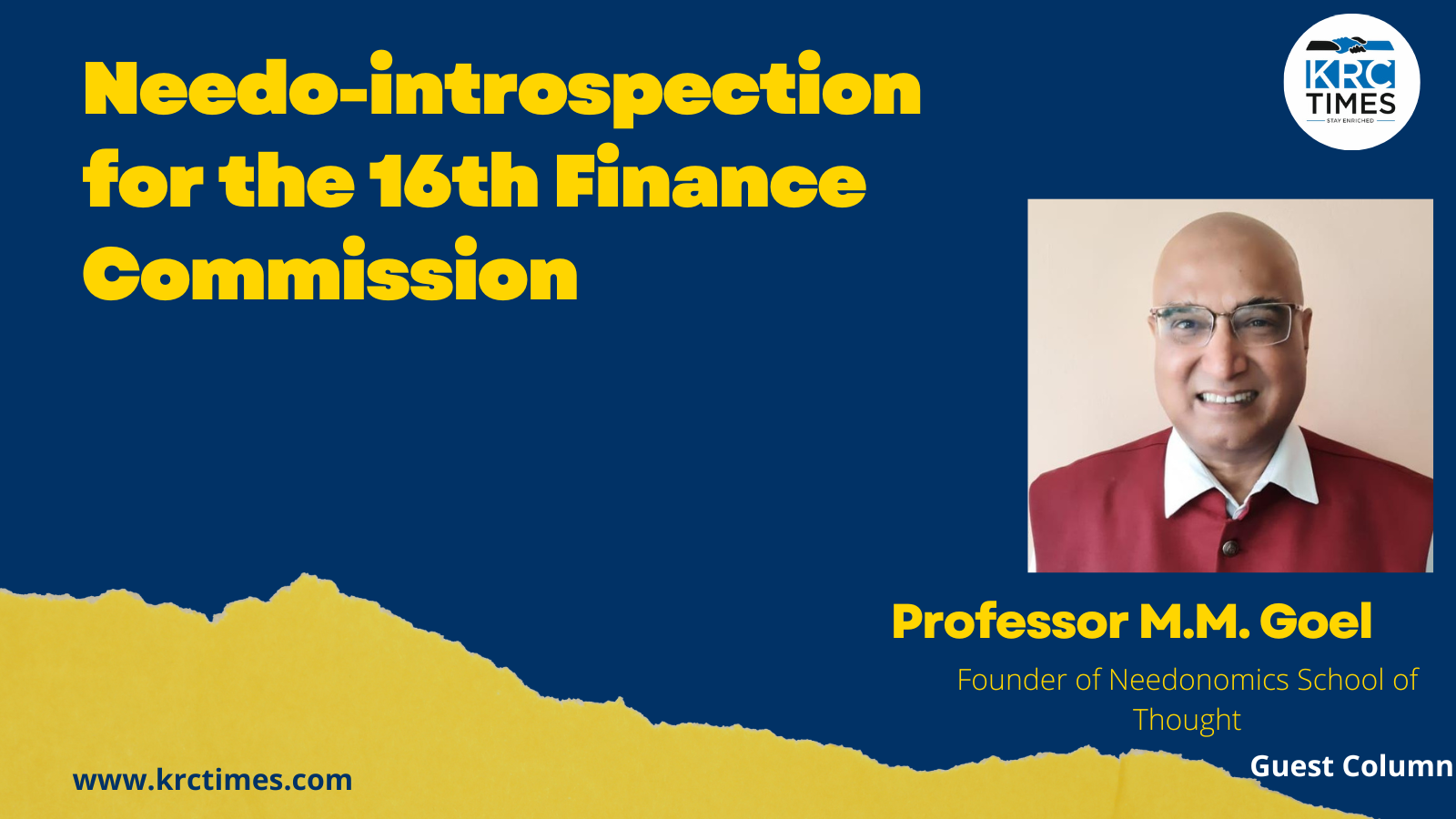We have to understand “Chakravyuha” Challenges in the economy making efforts to remove the fear of any crisis with a full sense of responsibility
 Dr. M. M. Goel
Dr. M. M. Goel

To understand the needs of finances (needo-finance) for 28 States, we must introspect the role and responsibilities of the Finance Commission (FC) as a constitutional body established under Article 280 of the Indian Constitution more than NITI Aayog replaced from the earlier holy cow the Planning Commission. It is pertinent to mention that I argued for renaming the building of Yojana Bhawan as Vitt Bhawan to recognize the well-deserved relevance of FC and I justify my position even now for our beloved Bharat to be made Vikasit towards 2047.
Given the objectives and techniques of Public Economics, we must examine the rationale for analyzing different aspects of fiscal policy including the 16th Finance Commission (FC) for Needo-financing which falls in the domain of Needonomics (economics of needs) propounded by this writer.
This is crucial when the appointment of the 16th (FC) is to be conceived by the Government of India to face the challenges and opportunities when the 15th Commission was set up in 2017. The 16th FC must take into account the fiscal scenario and global uncertainties as the fiscal deficit and debt were 10% and 89% respectively in 2022-23 (Centre and states taken together).
To achieve the aspiration of Vikasit Bharat with inclusiveness as a fair society, we must work without worries (www) for the generation of alternative sources of financing by local government, state government and the central Government as part of the federal economy.
It has to be noted that Union Budget 2023-24 of the size of Rs 4503097 crore targeted for Vikasit Bharat in 2047 with the intentions in terms of seven priorities as the ‘Saptarishi’ guiding us through the Amrit Kaal including inclusive development for careless and useless. The proposals convey the confidence with commitment of the Government in tune with the Needonomics School of Thought, as an insight into the philosophy of the present government on economic issues with an outlook on the long run (25 years) with the target of Vikasit Bharat in 2047. The long run may be a misleading guide to current economic affairs as J.M. Keynes once said “In long-run we may all be dead”. Sadly opposition is politically incapable of raising issues on the supply side vision (ignoring the demand side) to revamp the Indian economy. To sustain the momentum of infrastructural development, we must lay the foundations for job-led growth in the shockproof economy but needed public-private partnership ( PPP) model in letter and spirit.
We must note that the FC determines the vertical shares to ensure the quantum of the tax revenue of the Centre is given away to all 28 states. The horizontal shares are to be distributed among 28 states. The 15th FC recommended 41 percent when the number of states was reduced to 28 whereas the 14th FC had raised the shares of States from 32 percent to 42 percent of the divisible pool of union taxes. The safe implication of this observation is that there is no scope for increasing this share as there are fiscal imbalances for the Centre with a 6.5 per cent fiscal deficit and 58 per cent debt in 2022-23.
The 16th FC must consider the issue of the cess and the surcharge thereon increased. The ratio of states in the gross tax ratio (GTR) declined from 36.6 per cent in 2018-19 to 30.2 per cent in 2022-23 which must not exceed the upper limit of 10% GTR for cess and surcharges advised earlier by some economists. For implementation of the National Education Policy (NEP) 2020 with many challenges including financing the States, Education Financing in the States has a strong claim on the share in education cess of 3 per cent collected from the income taxpayers on the amount of tax.
We have to understand “Chakravyuha” Challenges in the economy making efforts to remove the fear of any crisis with a full sense of responsibility. To attract the PPP model in various sectors which are necessary to accelerate infrastructure development, the efforts are required to be strengthened more than resource allocations with reducing bureaucratic hurdles being observed time and again.
We need to allocate the financial resources in the best possible manner without prejudice based on the cannons of the public expenditure given by Dr. B.R. Ambedkar who said that every Government should spend the resources garnered from the public not only according to rules, laws and regulations but should also see that ‘faithfulness, wisdom and Economy’ are adhered to in the acts of expenditure by public authorities. The remarkable thing about Ambedkar’s canons of public expenditure is that they are ism-neutral and can be followed by large or small public sector and yet the principles behind these canons are applicable in analyzing, interpreting and adopting the solutions of the problems at hand.
We have to be alert, aware and awake of the ‘Cobra Effect’ which occurs when an attempted solution to a problem makes the problem worse, as a type of unintended consequence of unhappiness. We, the people need to become ‘Trustees’ not owners of the wealth and properties to enhance the shock-bearing capacity if not becoming shockproof for any crisis such as covid making history of its own. We have to replace fear with fearlessness and “work without worries” (www)- the real www in the virtual ‘world wide web’ (www) to become Vikasit Bharat.
We have to address illness in the behaviour of all the stakeholders as consumers, producers, distributors, traders, policymakers, and politicians in our beloved Bharat. The 16th FC have to understand and adopt the principle of Needonomics in totality which includes needo-consumption, needo-saving, needo-production, needo-investment, needo-distribution, altruism, needo-trade for glocalization ( think globally and act locally).
To consolidate the gains of good governance we must continue with policy reforms by becoming street SMART (simple, moral, action-oriented, responsive and transparent). In light of the above discussion, it can be concluded that 16th FC should focus on sufficiency, efficiency and equity in terms of all the pillars of the union budget as “Needo-financing”.
(The writer is Former Vice-Chancellor known as Propounder Needonomics School of Thought and a superannuated Professor of Kurukshetra University, Kurukshetra).

